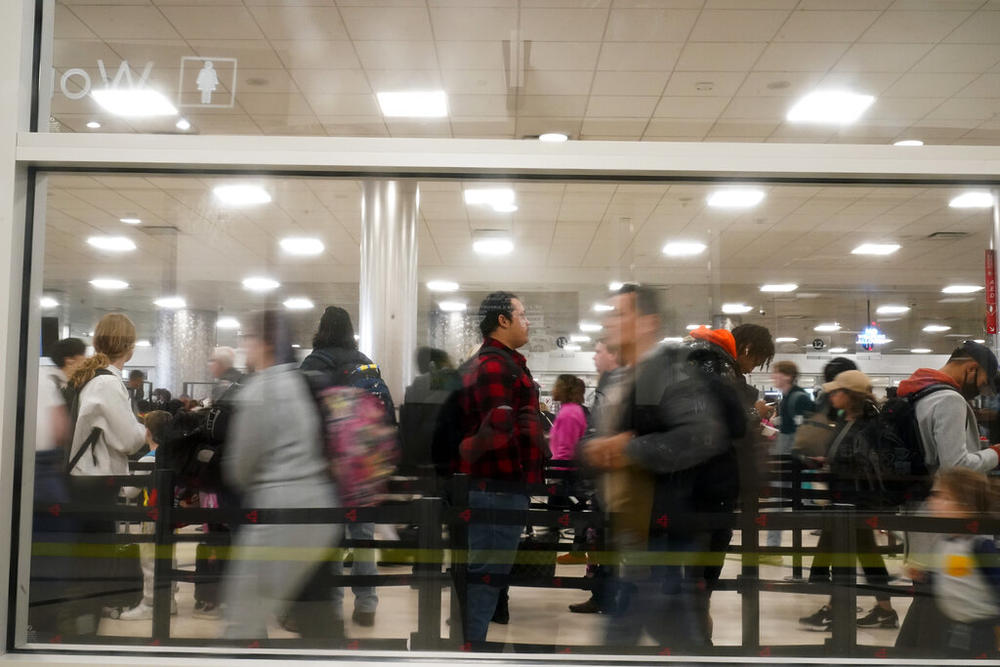
Caption
Travellers wait to go through security at the Hartsfield-Jackson Atlanta Airport in Atlanta, Tuesday, Nov. 22, 2022.
Credit: (AP Photo/Brynn Anderson)
LISTEN: Wearing masks and staying home contributed to historically low case counts for seasonal respiratory viruses during the last flu season. But now that it’s the holidays and more people are gathering, several respiratory viruses are adding to COVID-19’s disease burden. GPB’s Ellen Eldridge reports.

Travellers wait to go through security at the Hartsfield-Jackson Atlanta Airport in Atlanta, Tuesday, Nov. 22, 2022.
Except for COVID-19, Georgia saw historically low cases of respiratory illnesses in the winters since 2020. During the strictest quarantine, viruses suffered from a lack of available hosts.
Viruses are dependent on living hosts to replicate and spread. Wearing masks and other interventions simply delayed infections.
No one's immune system suffered because they wore a mask, avoided holiday parties, or didn't get sick.
As the coronavirus outbreak grew into a pandemic in 2020, health departments saw fewer respiratory syncytial virus (RSV) infections, which mainly affect children similarly to a cold. RSV can, especially in young children, can develop into pneumonia and be fatal.
But holiday travel and in-person celebrations are now allowing viruses to spread. And they are.
PREVIOUS COVERAGE: High rates of respiratory illness in Georgia are filling ERs with sick children
This flu season, which began in October, is already much more brutal than it's been the last few years.
An early spike this season in RSV cases is stressing some hospitals nationwide, including Children's Healthcare of Atlanta.
While the flu is rarely fatal, severe sickness can include nausea, vomiting, abdominal pain, weight loss, coughing fits, and fever. A bad case of influenza can ruin a holiday gathering; spreading COVID-19 could kill.
That's why U.S. Department of Health and Human Services Regional Director Antrell Tyson said it's worth getting annual flu and COVID shots.
"These vaccines are proven to provide strong protection from severe illnesses, hospitalizations and death," he said. "And, more importantly, they are free."
Even with non life-threatening cases of COVID that broke through vaccine protection, it’s important to notify a primary care doctor because there are medications that can help with symptoms. Also, reporting positive cases helps health officials track community spread.
Estimating how many local COVID cases are caused by a variant is tricky, especially with widespread availability of at-home test kits.
COVID cases peaked during summer 2021, when the delta variant of the virus appeared. At that time, hospitalized patients who were not vaccinated outnumbered vaccinated ones by more than 600%.
The Georgia Department of Public Health laboratory is only able to do variant testing on a subset of specimens that have enough preserved genetic material for testing.
"We know that we are missing variant surveillance from at-home tests, but it is important to remember that this is surveillance, and we are never going to get every specimen tested," Eric Jens with the DPH said in an email. "So, we do our best to get a random sample or a representative sample of the population to estimate what is circulating in our community."
Everyone who is eligible ― including those who are moderately to severely immunocompromised ― is recommended to receive one dose of the updated bivalent booster at least two months after their most recent dose (either the final dose of the primary series or the last booster shot).
The updated vaccine is bivalent, meaning it targets both the original SARS-CoV-2 virus and its variants, such as omicron.
Dr. Carlos del Rio with Emory University School of Medicine said last year’s booster has been replaced by the new bivalent one, and people can expect an annual COVID vaccine similar to annual flu shot recommendations.
"This is a different vaccine," del Rio said. "We don't tell people that you're going to get your flu booster, right? Every year we say 'You're going to get your flu vaccine'. So we need to get away from this terminology of boosters and we need to talk about you were getting your COVID vaccination."
Anyone may get the updated, bivalent shot at their local health department. Anyone who misplaced their original COVID vaccination card may get a new one with a state ID at the health department.